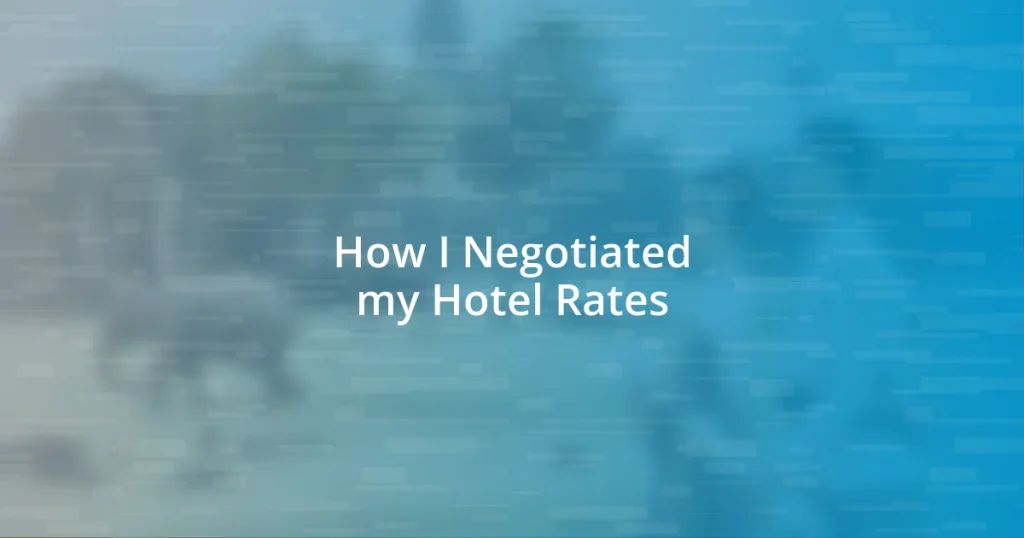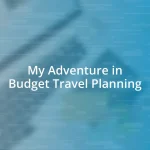Key takeaways:
- Understanding market trends, hotel occupancy, and seasonal pricing can empower you during negotiations.
- Building rapport with hotel staff through effective communication and emotional intelligence can lead to better rates and upgrades.
- Leveraging situations such as local events, loyalty programs, and a clear negotiation strategy can enhance your chances of securing favorable terms.
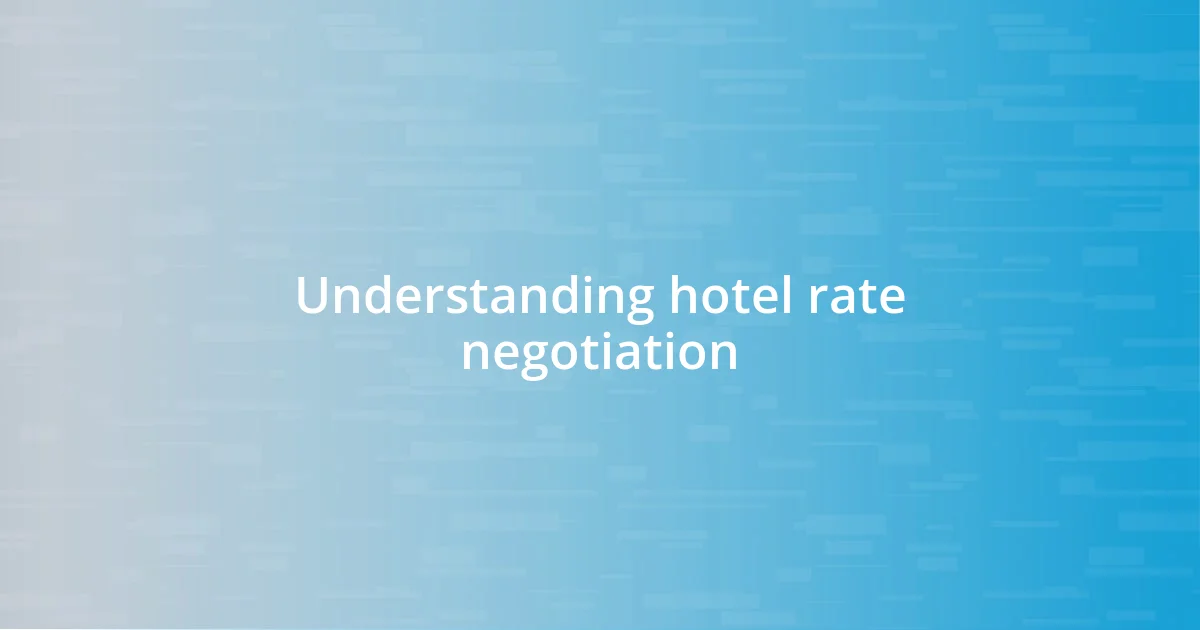
Understanding hotel rate negotiation
When it comes to hotel rate negotiation, understanding the dynamics at play can significantly affect the outcome. For instance, I vividly remember a particular trip where, despite being an off-peak season, the rates felt unreasonably high. This led me to wonder: what factors truly influence these prices, and how can I leverage them to my advantage?
Negotiating hotel rates isn’t just about haggling—it’s about comprehension. I’ve learned that knowing the market trends and the hotel’s occupancy levels can give you the upper hand. On one occasion, I noticed that the hotel was promoting a package that included breakfast and parking, but I didn’t need either. I politely questioned whether I could receive a better rate if I opted for a room-only option, and to my surprise, they agreed, reducing the rate significantly.
Emotional intelligence plays a crucial role in negotiation, too. I recall speaking with the front desk manager during one of my stays. By establishing a friendly rapport and inquiring about local tips, I was able to convey my genuine interest. This connection made all the difference, and I ended up receiving a room upgrade as a gesture of goodwill. It reinforced my belief that sometimes, it’s not just about the negotiation—it’s about building relationships.

Researching hotel pricing trends
Researching hotel pricing trends gave me a strategic edge during negotiations. I remember one instance when I was planning a family trip. By comparing rates from various travel sites for similar dates, I discovered a significant drop in prices during weekdays compared to weekends. This insight prompted me to adjust my travel plans, allowing me to negotiate better rates.
When digging into hotel pricing trends, consider the following factors:
- Seasonality: Understand peak and off-peak seasons for hotels in your destination.
- Local Events: Research any major events happening, as they often drive prices up.
- Advance Booking: Prices can vary depending on how far in advance you book your stay.
- Competitor Rates: Check what nearby hotels are charging to benchmark your negotiations.
- Loyalty Programs: Investigate if your membership in a hotel’s rewards program can yield discounts.
Being proactive about this research not only bolstered my negotiating confidence but also inspired me to think outside the box when discussing rates.
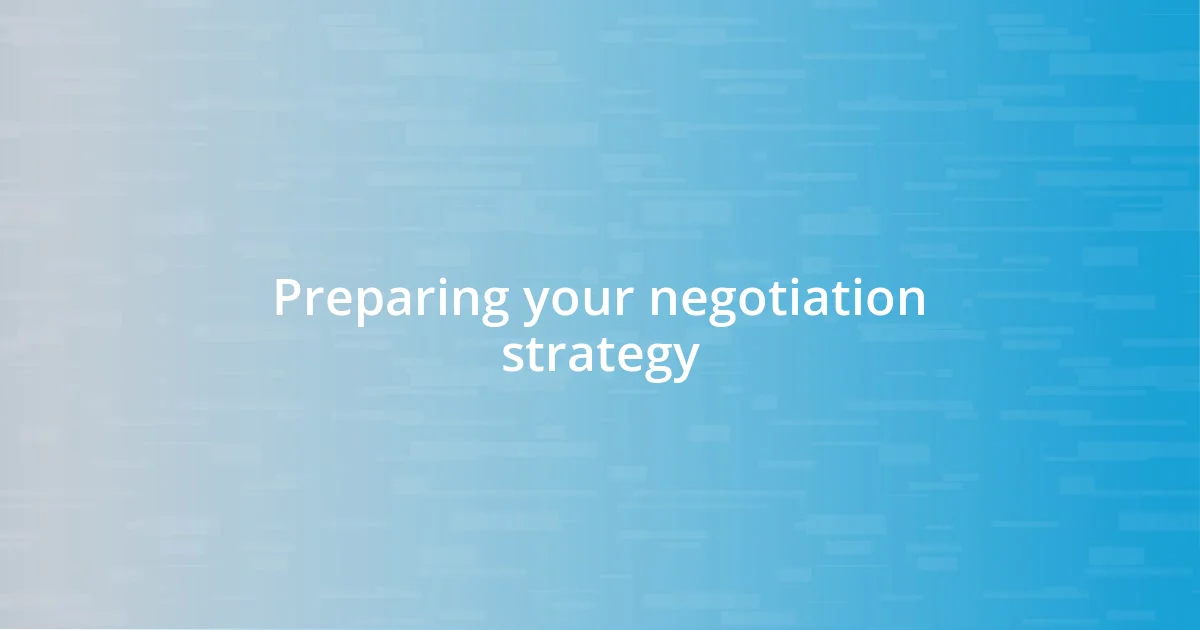
Preparing your negotiation strategy
Preparing a negotiation strategy can make all the difference in securing a favorable hotel rate. From my perspective, it’s crucial to have a clear understanding of your budget and what you’re willing to sacrifice for a better price. For example, on a past trip, I had a specific budget in mind, but I also prioritized flexibility in my travel dates. By expressing this flexibility to the hotel staff during negotiations, I unlocked options I hadn’t previously considered, such as special promotions and last-minute deals.
Another essential aspect is to gather all relevant information about the hotel and its surrounding area. I once made an inquiry about the rates by first mentioning my travels for a special event nearby. I later discovered that the hotel was fully booked for that event, giving me leverage in negotiating rate adjustments, since they would rather keep an occupied room at a competitive rate than risk losing the business altogether. Having this type of information can turn the tables in your favor and make you a more informed negotiator.
Lastly, always remember to practice active listening during negotiations. This skill has served me well in various scenarios. I distinctly recall a conversation where the hotel staff revealed they were actively looking to boost occupancy rates. By listening closely and responding with empathy, I was able to propose a rate that worked for both of us. It’s moments like these that illustrate how understanding the other party’s position can create a win-win situation.
| Preparation Strategies | Examples from Experience |
|---|---|
| Understand Your Budget | Prioritized flexibility in travel dates, unlocking better options. |
| Gather Relevant Information | Learned about the event that allowed for better negotiation leverage. |
| Practice Active Listening | Engaged with staff’s challenges to propose a mutually beneficial rate. |

Using leverage to your advantage
Using leverage during hotel negotiations can be a game changer. Once, while planning a weekend getaway, I stumbled upon a local festival that was significantly driving up hotel rates. With this knowledge, I approached the front desk and mentioned the festival while also highlighting my flexibility in checking in a day earlier. That small piece of leverage led to a surprise discount on my room rate—an unexpected win that made my trip even more enjoyable.
I’ve found that sharing a bit about your travel plans can also create leverage. For example, when I booked a hotel for a work conference, I casually mentioned that I was bringing a colleague who would also need a room. This comment prompted the manager to offer me a discount for both bookings. It was a delightful moment! It made me realize that establishing a connection with the hotel staff and being upfront about my needs can often lead to mutually beneficial arrangements.
Have you ever thought about loyalty programs as leverage? I remember checking in for a vacation where I was a member of the hotel’s rewards program. By just mentioning my status, the staff swiftly upgraded my room and offered a discount on the nightly rate. This experience highlighted how sometimes all it takes is a little nudge to unlock benefits just waiting to be discovered. Leveraging these programs truly enhanced my stay and motivated me to continue building loyalty in the future.
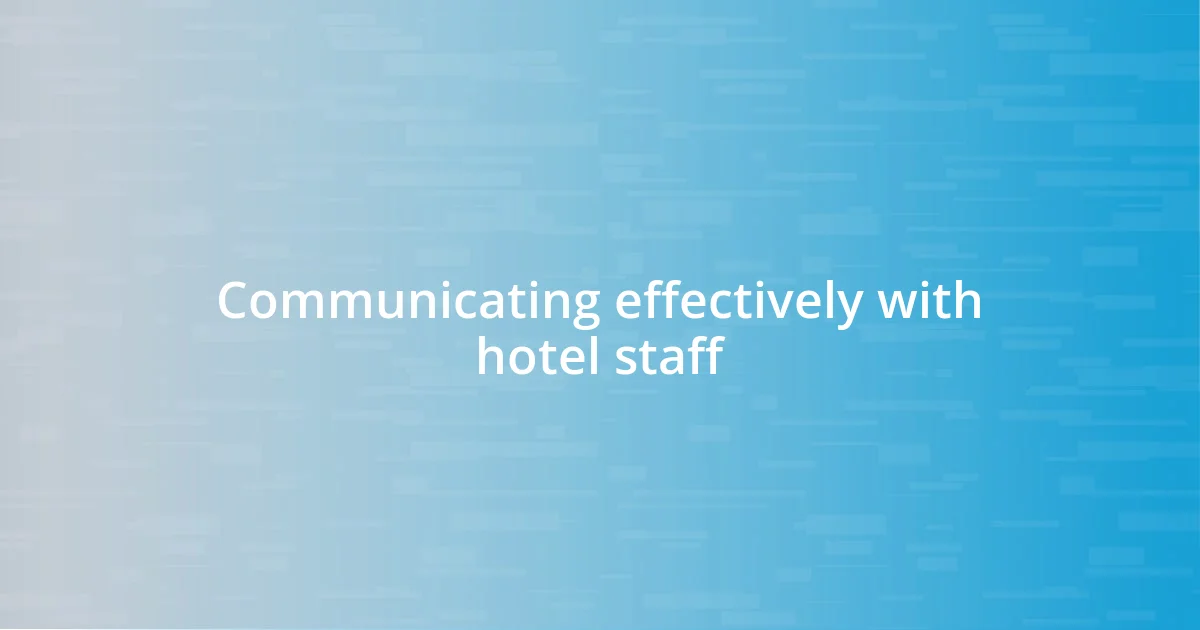
Communicating effectively with hotel staff
Effective communication with hotel staff is crucial when negotiating rates. I vividly recall walking into a hotel during an off-peak season and initiating a friendly conversation with the receptionist. Rather than jumping straight to rates, I asked about their favorite local spots. This approach not only broke the ice but also built a rapport, making it easier to discuss my budget and the possibility of a discount later. Have you ever noticed how a simple conversation can change the course of a negotiation?
I also believe in being clear and honest about my needs. On one trip, I mentioned my preference for a quiet room due to needing restful nights for early morning meetings. The staff appreciated my transparency and, in return, offered me a more favorable rate. It felt like teamwork—working together toward a solution that met both my requirements and their goals. When you communicate with sincerity, it often reflects back in the kindness and flexibility of the staff.
Additionally, don’t underestimate the power of gratitude during your interactions. I’ve found that expressing appreciation for the staff’s assistance creates a positive atmosphere. One time, after a lovely exchange, the manager slipped me an unexpected room upgrade just because I expressed genuine thanks for their help. It’s moments like this that reinforce my belief: being respectful and friendly doesn’t just make you likable; it can actually lead to better deals. How can you ensure you’re conveying that warmth when you next engage with hotel staff?











